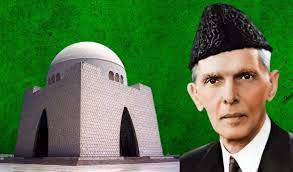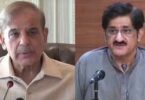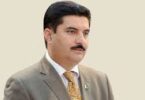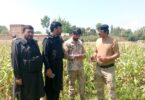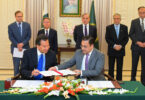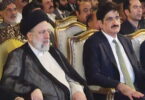F.P. Report
ISLAMABAD : The nation celebrated the 146th birthday anniversary of the founder of Pakistan, Quaid-e-Azam Muhammad Ali Jinnah, on December 25 (Sunday) across the country showing great zeal and enthusiasm.
The day dawned with special prayers for the progress and prosperity of Pakistan while the national flag was hoisted on the major government buildings in the federal capital, like across the country.
Public and private departments arranged a variety of events, including seminars, conferences, competitions, and discussion programmes, mostly during the last week to pay rich tributes to the father of the nation for his untiring struggle, sagacity, and leadership that led to the creation of a separate homeland for the Muslims of sub-continent.
Special events were arranged to highlight and promote the vision and messages of Quaid-e-Azam Muhammad Ali Jinnah, particularly with regard to rule of law, the supremacy of the constitution, and the upholding of democracy.
A special ceremony was arranged by the Pakistan Academy of Letters on December 22 (Thursday) to mark the 146th birth anniversary of Quaid-i-Azam Muhammad Ali Jinnah. The ceremony was presided over by noted literary person Dr Ehsan Akbar while Haroon-ur-Rasheed Tabassum, Yusuf Aziz, Jabbar Mirza, and Dr Fakhar-ur-Islam were the special guests at the occasion. A series of programmes were arranged by the National Institute of Folk and Traditional Heritage (Lok Virsa) on December 25 (Sunday) at the Pakistan National Heritage Museum which included a prestigious opening ceremony featuring vibrant performances at the Heritage Museum Hall, Lok Virsa, and screening of video documentaries on Quaid-e-Azam at the Pakistan National Monument Museum.
The essay writing competition was arranged by the Nazariya Pakistan Council in connection with the Youm-i-Quaid celebrations in which students of different educational institutions participated and exhibited their extraordinary oratorical skills. A cycle race was arranged by the Islamabad Cycling Association on December 24 (Saturday) around F-9 Park (Bolan Gate) on the main roads.
Pakistan Tehreek-i-Shaoor also arranged hiking at Trail 5 followed by a discussion on Quaid’s life on Sunday with the purpose to highlight the vision of the founder of Pakistan in a unique way. While Bazeecha Trust marked the day by arranging special functions on Sunday.
Paying tribute to the father of the nation, President Dr Arif Alvi urged the nation to reiterate its commitment to cherish and uphold the vision of Quaid-e-Azam Muhammad Ali Jinnah for Pakistan and mobilize resources to tackle the grave issues to move on the path of political stability and economic prosperity.
“On this day, we express our gratitude for carving out a separate homeland for the Muslims of the sub-continent where we are free to realize our dreams as envisioned by the Quaid. Due to his untiring efforts, we were blessed with a country where we can live and breathe as free men and can develop it according to our own wishes and culture and uphold the principles of Islamic social justice”, he said.
In his message, Prime Minister Shehbaz Sharif called on the nation to take guidance from the life of Quaid e Azam Muhammad Ali Jinnah and follow his principles to ensure the progress and prosperity of Pakistan.
He emphasized that the Pakistani nation today needed to follow Quaid’s thoughts and principles, adding that in Quaid’s Pakistan, nobody would have superiority on the basis of language, class, religion, or numerical strength.
Muhammad Ali Jinnah was a lawyer and politician who served as leader of the All-India Muslim League from 1913 until Pakistan’s independence on August 14, 1947, and then as Pakistan’s first governor-general until his death on September 11, 1948.
He was a true and upright leader whose devotion and committed efforts resulted in the creation of a separate homeland for the Muslims of the Sub-continent.
He, with his leadership qualities and his vision, changed the map of the world. The new generation should make Quaid-e-Azam their role model and follow his principles. (APP)

